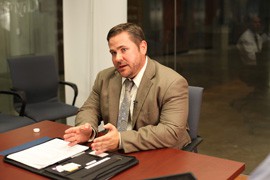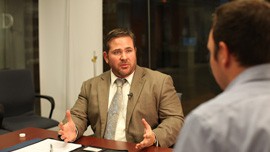Cronkite News has moved to a new home at cronkitenews.azpbs.org. Use this site to search archives from 2011 to May 2015. You can search the new site for current stories.
Official: EPA should recognize Arizona’s ‘unique environment’
PHOENIX – The Environmental Protection Agency and Arizona have a common goal of following the Clean Air Act, but federal officials should recognize the “unique environment” here as they evaluate plans, a state official said Tuesday.
“Let us figure out how to do it,” said Henry Darwin, director of the Arizona Department of Environmental Quality. “That’s really where our biggest issue with the EPA is, in the ‘how’ not the ‘what.’ Our missions are still aligned.”
Darwin made the comment during a wide-ranging interview with Cronkite News Service that also touched on his agency’s handling of permits for two controversial copper mines and how ADEQ is continuing its mission after staff reductions and losing its general fund appropriation.
Arizona and the EPA have wrangled over air quality as it relates to regional haze and particulate pollution, among other issues.
In July, the EPA rejected part of Arizona’s plan for addressing regional haze that affects views of the Grand Canyon and other sites, proposing that three coal-burning power plants add high-tech equipment to reduce emissions of nitrogen oxides.
“We are not talking about public health or environmental health, we are talking about visibility in the Grand Canyon,” Darwin said. “From my perspective that should not be the focus in Arizona right now.”
Darwin called that issue an example of interest groups with narrow priorities setting the agenda by suing the EPA. Public health-related issues and true environmental issues wind up not being as addressed as a result, he said.
“That doesn’t seem like it’s what the Clean Air Act envisioned,” Darwin said. “It’s certainly not how I would run my program if I were given a choice on which programs or which issues we should be focused on.”
Meanwhile, the EPA is considering Arizona’s latest plan for bringing Maricopa County into compliance on particulate air pollution, and Darwin said he was optimistic that it will be approved. The difference this time around, he said, is that the EPA was involved in discussions about how to consider pollution levels on days with windblown dust.
“I’d be surprised if they didn’t approve it,” he said.
Darwin oversees an agency that has seen its staff reduced from 740 to 450 due to budget cuts and that has lost its general appropriation, leaving ADEQ funded 85 percent by increased permit fees and 15 percent by the EPA.
After initially focusing on just continuing its core mission, Darwin said, ADEQ is identifying ways to restructure its operation to be more efficient, particularly when it comes to the time involved in reviewing permit requests.
“We want radical simplicity for our customers and our staff,” he said. “The fact of the matter is that through the last 25 years we have become very cumbersome to deal with externally and internally.”
The goal, he said, is focusing on what’s important and eliminating processes that aren’t.
“This is not about rubber-stamping permits or sacrificing quality for quickness,” Darwin said.
ADEQ faced criticism in August for taking over the air quality-permitting process for the proposed Rosemont Mine in Pima County. Darwin said the agency did so only after a state judge ruled that the county was “arbitrary and capricious” in denying the permit and added that ADEQ’s requirements were more restrictive.
He also said he’s faced no pressure on a proposal by Curis Resources to mine copper next to Florence by injecting an acid solution into the ground to leach out the metal. The Arizona Republic reported recently that a lobbying firm engaged by the company worked on a speech that Gov. Jan Brewer delivered to announce her support of the project.
“I do not get pressured by the governor’s office to make technical decisions,” Darwin said. “I don’t want anyone thinking that somehow I was making decisions that weren’t based on the science or the law.”
Air- and water-quality permits for mines usually spark passionate debate, Darwin said.
“These are not easy decisions,” he said. “I have not yet experienced issuing a permit to a mine that doesn’t have this type of controversy.”









